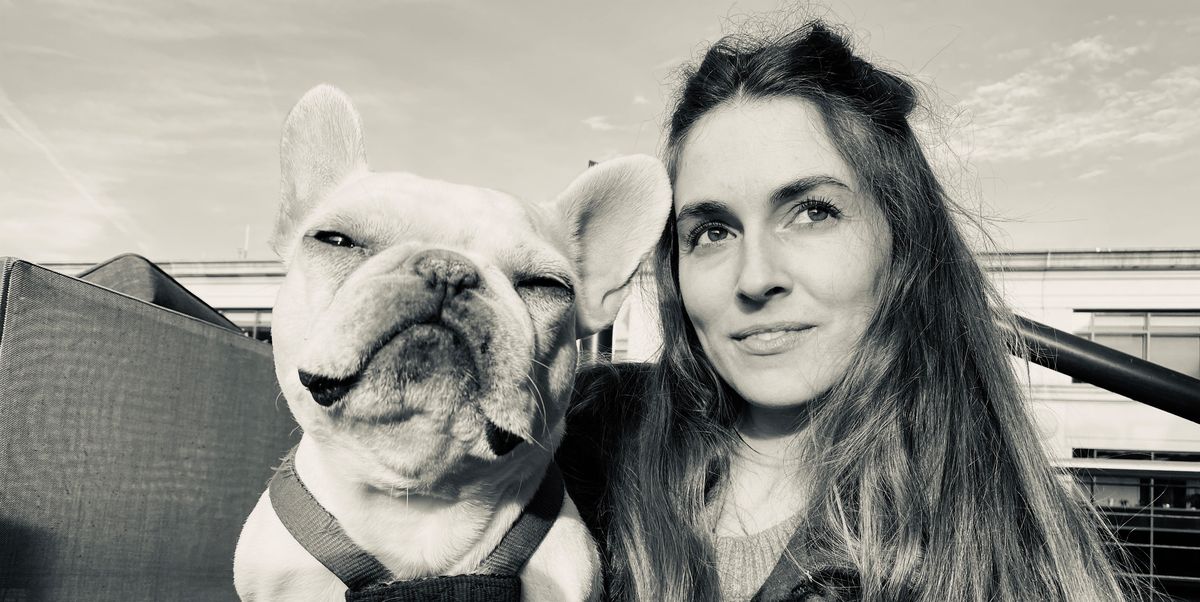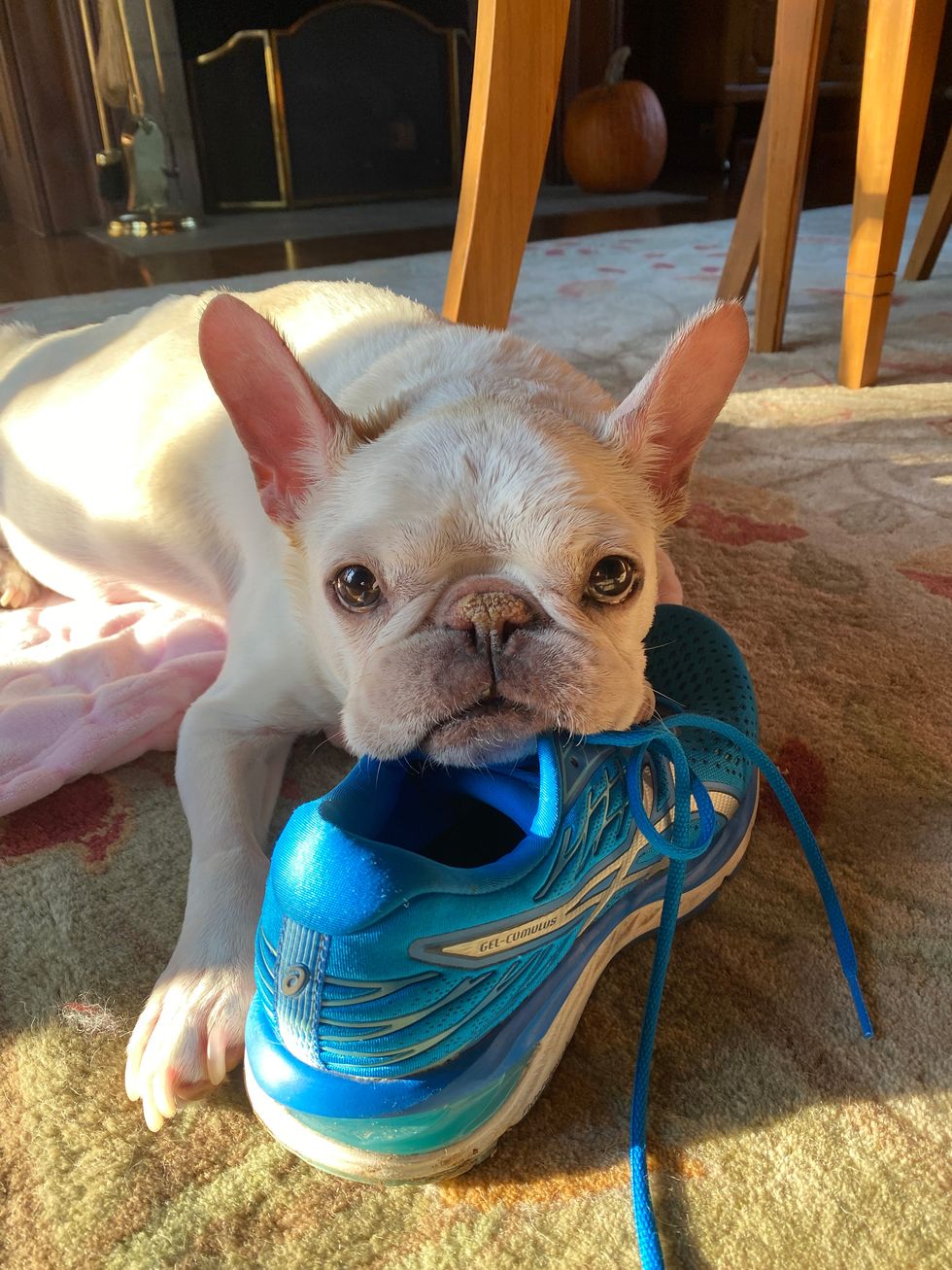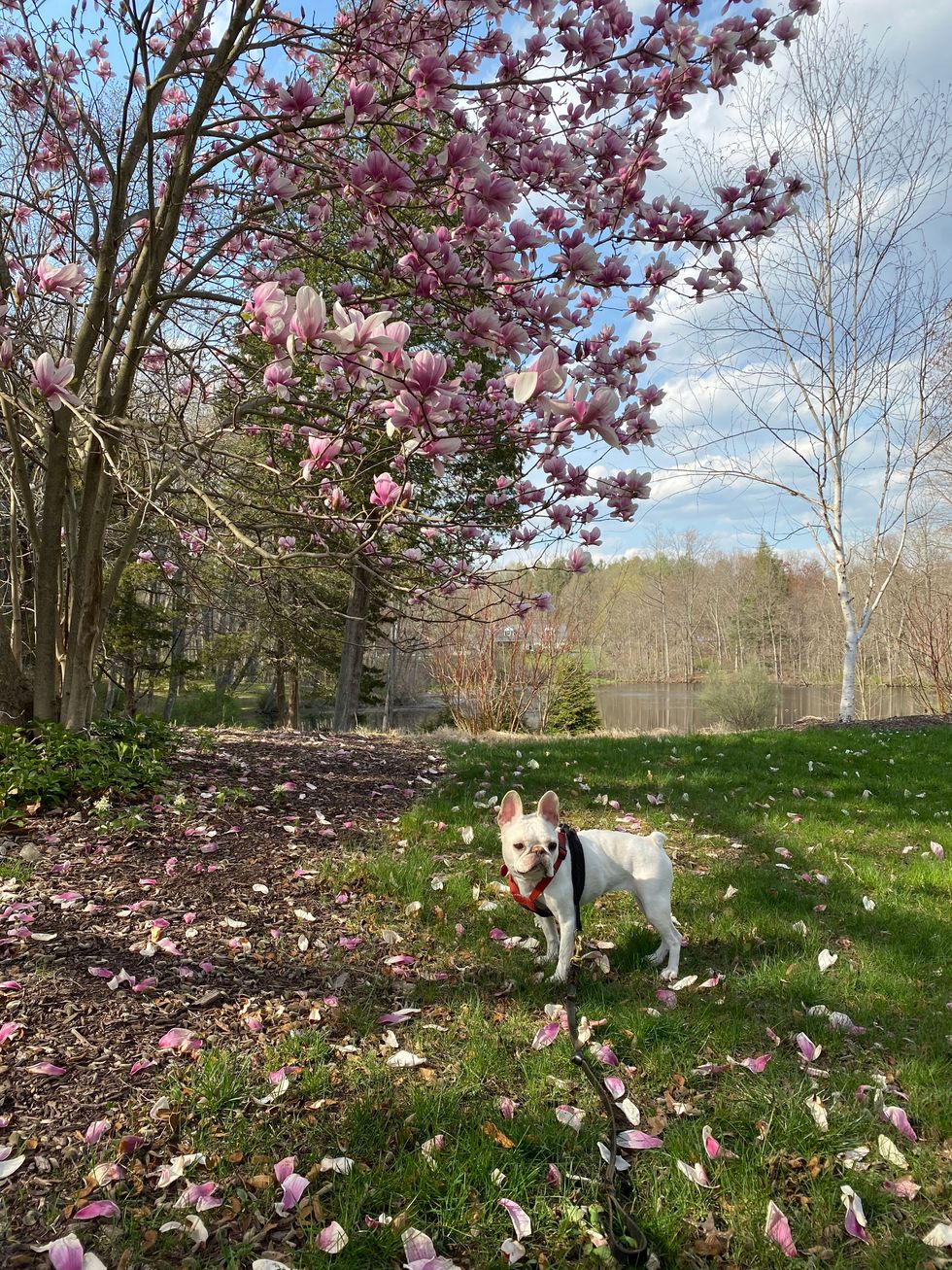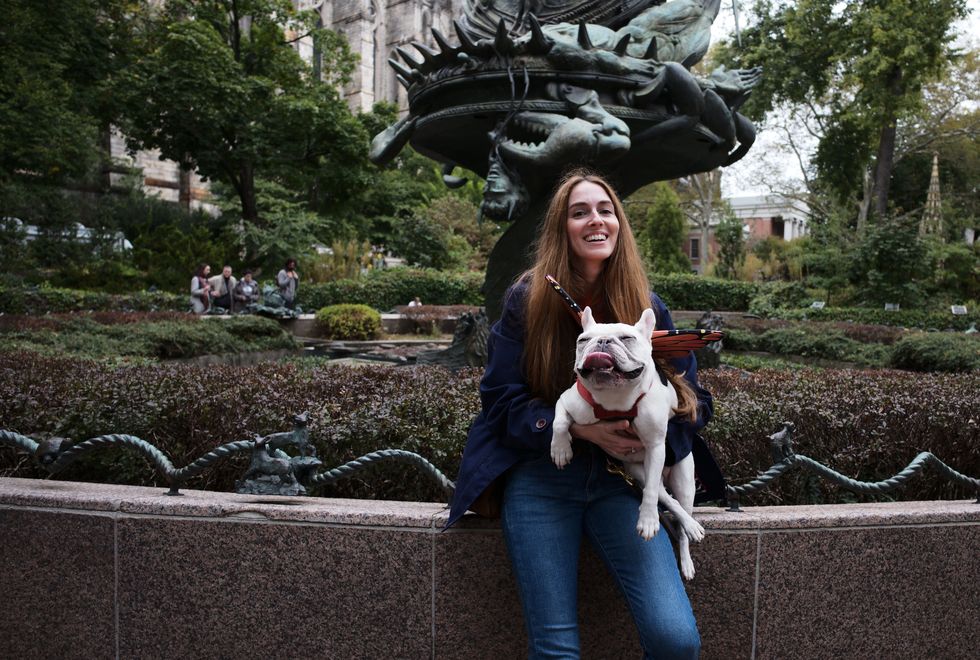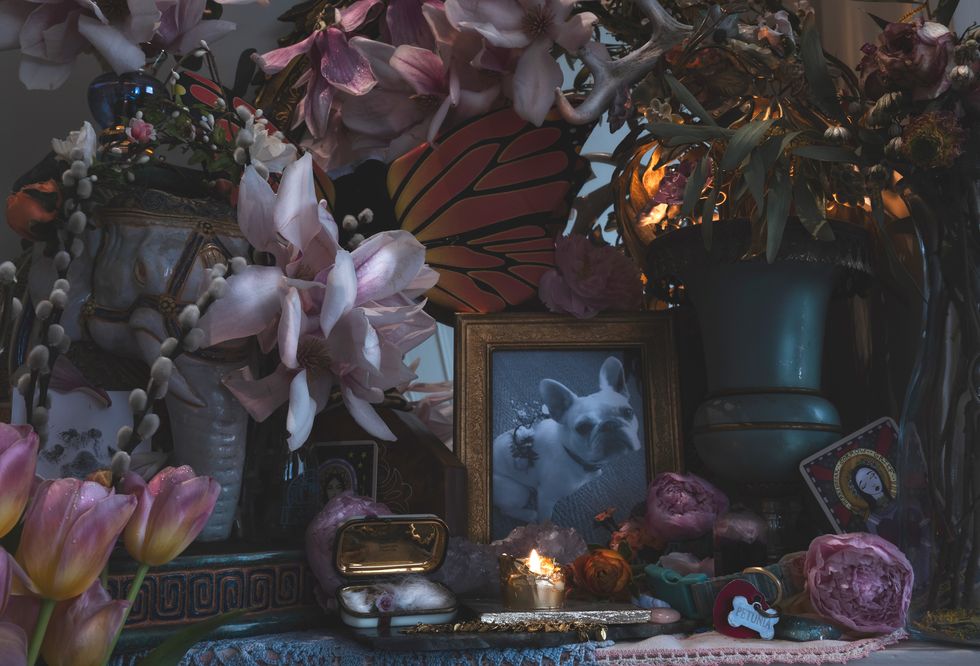In February, nearly 10 years after she was first placed in my arms, I instinctively felt something was severely wrong with my French bulldog, Petunia. Every vet I brought her to could find nothing in her tests or blood work that indicated cause for concern, but I knew my pet, and I knew she was sick. She started sleeping all the time; she had periods of confusion; she looked all-around depressed. I did every noninvasive test I could—EKGs, echocardiograms, etc. Due to her past medical history, she was not a good candidate for anesthesia, a necessary component of CT scans and MRIs. When her fur started shedding profusely and she stopped being able to walk without balance issues, I brought her to a cardiologist at a hospital in New York City, wondering if her heart issues were to blame. This vet had cared for her during many of her other emergencies.
“Petunia’s heart disease has rapidly progressed,” she began, “and it does not look good. But unfortunately, that is not the biggest issue going on.” The neurologist took a look at her as a courtesy, because all the vets here could tell this was not the Petunia we knew. She determined that Petunia likely has a brain tumor or brain stem disease. “Without a scan, it is impossible to determine the exact issue, but Petunia should not go under anesthesia, and to be quite honest, at this point, it doesn’t really matter. I am so sorry to tell you she is at the end of her life.”
While Petunia had an undeniably adorable face, she was not what you would call “a good dog.” She was, in fact, very, very naughty. She inherited one of the worst terrier traits: resource guarding. Resource guarding happens when a dog is so protective over something, they become aggressive when you attempt to take it away from them. Many dogs resource-guard their toys. Petunia didn’t do this, but she did guard literally every single thing on the floor that she deemed belonged to her—which were most things.
Oh, you dropped a tube of ChapStick? Forget about it, that’s Petunia’s now. A sock didn’t make it into the laundry hamper and Petunia found it? That’s now Petunia’s sock. You dared to accidentally spill coffee on the floor and want to clean it up? I’m sorry, don’t even consider getting near that area with a paper towel. Not only does that spilled coffee belong to Petunia—the floor below it does as well. Should Petunia’s stereophonic bat ears or her saucer eyes detect an ill-fated human accident that landed an item on the ground, she was poised at any moment to rush toward it at full speed, growl-rumbling, bark-sounding. It was terrifying. It was also very, very funny.
I never left anything on the floor; shoes always went on a table to the confusion of anyone who entered my home. For many years, I couldn’t leave remote controls out—she would jump up and steal them. During those times when I did drop something and she got to it before me, there was an entire protocol I followed to get that item back.
“Petunia, leave it,” I’d say in a firm voice, which she would completely ignore. “Do you want a treat?” I’d really hit the word treat, my voice scaling a full octave.
She’d look at me, unimpressed, then look back at the stolen item—let’s call it a pen. She’d then look back at me, a woman who carefully weighs her options.
“Petunia, go to bed.” I’d point to the bed. She knew that if she went to bed and let me pick up the pen, her reward would be the treat, but she didn’t yet know if it was worth the trade. We’d engage in a three-minute eye-to-eye stare down that usually ended with her not going to her bed, but instead lying down on the floor right where she was with her muzzle on top of the pen.
“Petunia,” I’d say, “Go. To. Bed.”
Two more minutes would pass.
Reluctantly, Petunia would get up, walk over to her bed, and sit.
“Good girl! Stay.” I’d put my hand up, the signal she and I had agreed on for “stay.” I’d go to move toward the pen. She did too.
“Petunia…STAY.” At this point, I’d sound like a mom who means business. I’d walk over and pick up the pen while Petunia glared at me like she wished me a slow, painful death.
“Good girl! You’re such a good girl! GOOD. STAY!” Then, Petunia would get her treat and immediately forget that she was ever guarding anything. She’d turn back into a sweet, affectionate dog who wants kisses and attention, and who will lovingly headbutt you if you stop petting her. This would repeat over and over and over.
I once contacted an animal communicator in hopes that Petunia would be able to tell me things about herself to better my understanding of her. In turn, I would be able to ask her to stop guarding everything. The animal communicator was very clear in her directives—during the session, which was over the phone, all I needed to do was have Petunia in the room and make sure she didn’t fall asleep. She explained to me that Petunia might appear to go into a sleepy trance (she absolutely did), but as long as she wasn’t asleep, the communicator would be able to speak with her and translate back to me.
“Animals have their own personalities and free will, so just because I ask something of Petunia does not guarantee Petunia will listen,” she forewarned.
Now, please know I am a woman who owns five tarot decks; a woman who burned a death candle to break the psychic bond with her past life; a woman who collects the bones of dead animals, cleans them, and puts them on her altars. Yes, altars is plural. I never once questioned if this woman was for real, but when she described some of Petunia’s behavior and correctly connected it to the specific layout of my house at the time, I was totally sold.
“Sometimes, your mom drops something or puts something on the floor and needs to pick it up,” the communicator explained to Petunia. There was about a 15-second pause and then the communicator said, “Okay, Petunia is saying that, yes, it’s true, she does guard things and sometimes goes upstairs to your closet and steals things she is not supposed to have. But Petunia would like to point out that she has never destroyed anything.”
The communicator asked me directly: “Is that true?”
Yes. It was true. In all her years of stealing socks, shoes, pens, ChapStick, remotes, hats, the list goes on, she never even once destroyed anything. She would simply lay with her head on top of the stolen item, growling at anyone who dared approach her. Petunia’s objective was not to chew, rip, or destroy, her objective was merely to have a little treasure of her own.
Petunia also believed she should be included in everything a person might do and acted out when she sensed she wouldn’t be included. Let’s say it’s nighttime; I’ve been home all day wearing jeans and a T-shirt, but now I have to get ready for dinner with friends. Watching me change into nicer clothes would prompt a hunt for something she could steal. She would then bring that item back to me, ensuing my lengthy dance to retrieve it from her. If she could find nothing to steal, she plopped against the front door, her 21-pound body obstructing my exit.
“I told Petunia that sometimes you need to go out,” the animal communicator said, followed by a pause, “Okay, Petunia said that’s fine, she can come too.”
Then, speaking to me, she said, “I think I’ll rephrase this for her.”
She continued, “I told Petunia that maybe Mom might take Petunia out with her but, when you arrive at your destination, there might be a sign that says ‘no dogs allowed.’”
Another brief pause, “Alright, well, Petunia said that, if she can’t go inside too, then you can both go home together.”
Eventually the communicator said, “Petunia thinks she is a star and a queen, so I’m not sure she is going to respond to anything about her being left out simply because she’s a dog.”
I already knew this to be true about Petunia. I’m not sure why I thought an animal communicator could convince her otherwise.
Petunia and I moved to Connecticut in December 2020, in the wake of my severe mental health breakdown and what appeared to be the impending end of my marriage. We fused even more deeply together in an attuned and totally symbiotic relationship. She never let me out of her sight. In fact, she watched me intently, as if I was the thing she now needed to guard, though, where guarding once incited her primal rage, she would now guard me with the deepest kind of love I had ever known.
My mental health hinged wholly on my dog. When I was hospitalized for depression, self-harm, and severe suicidal ideation in the first two weeks of 2021, the doctors asked me to make a list of my reasons for living. Petunia was the one and only thing on that list.
When I returned home, it was as if Petunia knew this and took her job very seriously. She mellowed, almost overnight. Except for an errant sock theft here and there, she stopped resource guarding. She sat at my feet at every meal. She followed me around my property without a leash, never straying more than 20 feet and always galloping back to me when she did. Petunia became an entirely new version of herself. It wasn’t a different self. She still tried to bite the vet when she had her nails trimmed and she still chased and bit any man’s feet. Yet she seemed to unlock an extra part of herself that was always there, waiting to emerge when it needed to.
By late 2021, Petunia was completely deaf. It took me a while to realize it, as she’d always had selective hearing depending on what she did and did not want to do. She was across a room with her back to me, I was calling her name, but she wasn’t acknowledging my voice. As I approached her, all the while saying her name, she continued to have no reaction. Finally, I bent down to pet her back, and when I did, she startled. She hadn’t seen me coming, but it was clear she hadn’t heard me, either. Following this incident, I took note that she was making much more eye contact with me than she had before. Throughout the day, I maintained a near constant dialogue with her and she would watch my face to read my cues. She stayed in close proximity to me always, and in the absence of sound, we became even more attuned to each other’s presence.
A large portion of my life became dedicated to her medical care in the last two years of hers. Medical calamities had always been a part of Petunia’s world. Petunia’s vet records were over 200 pages long, with five entries on pneumonia, chronic ear infections, not one, but two nose surgeries due to her face being literally concave, even a run-in with a snapping turtle who leapt into the air to snap her cheek. Until that day, I had no idea turtles leapt. She had degenerative disc disease in her spine. She had a heart murmur. She had permanent scarring on her lungs. She was allergic to almost everything. Her vet bills were exorbitant. I’m too embarrassed to print them here. Petunia’s life only lasted as long as it did because I was in an incredibly privileged financial situation. Let this be a disclaimer to any person who is lured to Frenchies by their expressive faces and silly personalities: if you are considering getting one, don’t. They are a breed that persists only through human medical intervention, and ethically, that is not a type of dog that should exist. Petunia was a lemon, but she was my lemon, and I loved her unconditionally.
The days that followed my conversation with the cardiologist were some of the hardest of my entire life. I cried more tears than I knew I had in me. I hugged her. I fed her sardines. I told her I loved her 100 times a day. Then, on April 11, an unseasonably warm, sunny day when the magnolia tree in my yard—a tree I’d spent so much time sitting under with Petunia—was in full, extraordinary bloom, I made the decision that Petunia’s life should come to a close. I knew she wasn’t in pain yet—she hadn’t totally stopped eating, nor had she begun seizing—but these were all inevitable.
On that warm evening in April, I sat outside with my mom, Petunia’s primary care vet, Dr. Evelyn, and her tech, Kelly. The crickets and the peepers sang. The birds chirped and trilled. Only minutes before I had held Petunia, walking her from room to room of our house, recounting all the things we did together in those sacred spaces—“This is where we ate dinner. This is where you watched me bake banana bread. This is where you kept me company while I edited photographs. This is where you sat on your own yoga mat while I stretched. This is where you helped me sew lampshades. This is where we pulled tarot cards every morning. This is where we watched movies.” She was my constant through marriage, four moves, graduate school, a career change (or two), a mental health crisis, a divorce, and finally a reinvention. Now, she sat in my lap as Dr. Emily and Kate facilitated her peaceful passing. From a small speaker, St. Cloud by Waxahatchee played Petunia into the spirit world. This was an album I listened to thousands of times with her, dancing with her in my arms to “Can’t Do Much”; laying with my head in her dog bed, tucked against her paws, listening to “Lilacs”—“I won’t end up anywhere good without you, I need your love too,” I’d sing to her.
She took her last breaths while cradled in my arms. Even after life had left her body, I sat with her, held her, and continued to talk to her. I told her how much I love her. I told her how grateful I was for her love and companionship. I promised her that I was okay and that I would be okay without her; crushed, lonely, but okay. I thanked her for staying with me—for guarding me—until I was strong enough to survive without her.
Writer and Artist
Anna Marie Tendler is a multidisciplinary artist whose mediums include photography, textiles, drawing, interior design, and writing. She holds an M.A. in fashion and textile history from NYU’s Costume Studies program. Her master’s thesis, titled The Lip Filler Phenomenon: Modern Medicine, Kylie Jenner, and Postfeminist Female Sexuality, charts the contemporary history of dermal lip filler, as well as the correlation between plastic surgery and sociocultural politics of female aesthetics. Much like her academic research, Anna’s artistic work explores the many facets and complexities of the female identity.
